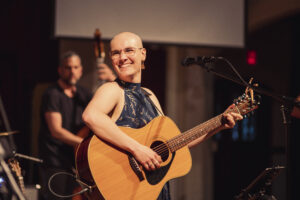Welcome Sarah McInnis, Music Therapist
 “Where words fail, music speaks.” – Hans Christian Andersen.
“Where words fail, music speaks.” – Hans Christian Andersen.
The Board of Directors of Valley Hospice Foundation are happy to welcome Sarah Catherine McInnis who has been hired to establish a program of music therapy for people being served by the palliative care team in both Valley Hospice and their homes.
Playing and composing music and lyrics has always been an important part of Sarah’s life. While she knew that she would like to make music her career a series of distinct incidents helped her recognize that music therapy was her calling. Playing music for her grandmother and other residents in the long-term care facility where her grandmother lived, Sarah saw the impact of music on this population. A documentary, Alive Inside, assisted her to recognize the ability of music to help people living with dementia to reconnect with their past. Finally, a chance meeting in Ontario, with a recent graduate of the Acadia Music Therapy program exposed her to the opportunities offered by this profession. Sarah recognized that music therapy could be the path to bring together all the threads of musical interest she had been developing.
Sarah explains that music therapy is more than offering music for entertainment, it is “an evidenced-based discipline in which credentialed professionals use music purposefully within therapeutic relationships to support development, health, and well-being”. Music therapy involves an assessment process that requires the music therapist to have clinical training and experience. The therapist fosters a therapeutic relationship where goals are set for each patient, and intentional choices are made to address those goals. Throughout their interactions the therapist responds to emotional needs and cues, and this requires constant re-evaluation of the goals.
In explaining the difference between the role of a traditional musician and that of a music therapist Sarah gives the following illustration:
“I write my own songs as a form of personal self-expression. I consider my own experiences and reflect them in the lyrics that I write. This can often be a cathartic experience for me as a songwriter and while it may or may not resonate with the experience of others it can be enjoyed by those who hear it.
If I was to write a song with a patient, with myself in the role of music therapist, I would be focused on supporting the self-expression of that person and giving them autonomy over the process in whatever way I could (control over the topic, the lyrics, the instrumentation, musical style), and ultimately I would support that person in conveying their own internal truth, outward.”
Sarah believes that her response to death and dying has not been dis-similar to most people. She finds that death is still “the thing that people don’t talk about and tiptoe around”. This likely comes from peoples’ fear of death and while she may share this fear, she also has a curiosity about death and dying that has encouraged her to become “better acquainted with death”. Sarah believes that “fear and curiosity can co-exist, and music can be the bridge to facilitate that coexistence.” “Music has supported me in the past when I have experienced intense periods of grief and I hope to use my skills to bring a bit of peace or light to someone’s final days.”
Sarah appreciates that music therapy has the potential to address the whole person- mind, body and spirit. It provides the opportunity for anxieties to be voiced and heard, and the individual’s lifetime of experiences to be heard and reflected on. She would love for the music therapy program at Valley Hospice and in the community to be “a core non-medical modality that complements and supports the more traditional forms of care someone will receive when dying.” She further suggests that “it would also be ideal to have music therapy provided to those who are grieving following a death.”
When asked about the impact of her work on her own life Sarah states, “My perception of life has changed because of my work. I am reminded daily how important it is to live in the present, express gratitude to loved ones, not wait to do things, and to be intentional about how I spend my time. I have been more conscientious of bringing joyful experiences into my life and taking time to reflect on what our experience here means.”

